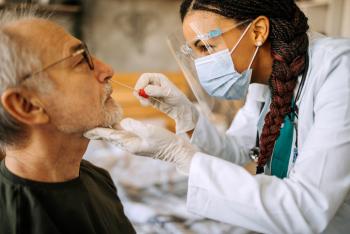Long COVID refers to a range of persistent symptoms that can linger for weeks, months or years after...
Read More

Over the past year and a half, health care providers have worked tirelessly, both fighting the COVID-19 pandemic and trying to navigate the “new normal” the virus has forced our industry into. Unfortunately, the pandemic has led to widespread rates of burnout among providers. A recent study reported that six out of 10 physicians say they often experience feelings of burnout—a number that’s 20 percent higher than pre-pandemic levels.
Here’s what we know about why physician burnout became so prevalent during the pandemic and what Inspira is doing to address it.
Physician burnout involves three main components: emotional exhaustion, a lack of sense of personal accomplishment and depersonalization. Burnout is often accompanied by a lack of purpose, a decreased drive to care for patients, symptoms of fatigue, difficulty concentrating and depression.
“Burnout usually happens when the stressors at our jobs become greater than the resources we have to deal with those stressors,” said Steven Linn, M.D., chief medical officer at Inspira Medical Centers Vineland and Elmer. “Stress is a normal part of life, but we need to be able to manage it by giving ourselves breaks during the day, stepping away from our computers and patients and practicing a healthy work-life balance.”
Physician burnout not only affects the providers themselves, but also their patients and their practice as a whole. “When physicians are experiencing burnout, they’re at a higher risk of leaving the profession, leading to more turnover at the organization level,” said David Galetto, M.D., chair of Physician Wellness and Care Redesign/Patient Physician Engagement Committees at Inspira Health. “In addition, physician burnout can lead to increased errors and unintended outcomes in terms of patient care.”
The past 18 months have been exceptionally difficult for health care providers in terms of burnout. “At the beginning of the pandemic, we were dealing with long hours, constantly changing information, high stakes for patients and a lack of access to resources—all of which factored into an increase in the physical, mental and emotional stress placed on our providers,” said Scott Wagner, M.D., chief medical officer at Inspira Medical Center Mullica Hill and Inspira Health Center Woodbury.
Although the health care community didn’t hesitate to mobilize during the hardest moments of the pandemic, providers could not possibly have been able to sustain the pace of work nor the stress associated with COVID-19. “Even with vaccines, medications and therapeutic options to care for patients, providers still lack a feeling of relief because there’s no real end in sight. The challenges and hardships associated with COVID-19 will be impacting our patients, staff and providers for the foreseeable future— which increases the likelihood for burnout to occur.” said Dr. Wagner.
The best way to help others is to first help yourself, so it’s important to address feelings of burnout before they become problematic. “It all comes down to having the most effective resources to help you manage stress in the healthiest of ways,” said Dr. Linn. “At work, this looks like managing your workflow, taking breaks when needed and conversing with colleagues so you’re not just seeing back-to-back patients all day. Outside of work, this could include an exercise routine, scheduling downtime away from your devices and consistent socialization with friends and family.”
Thankfully, Inspira is here to help prevent and address physician burnout with a variety of resources. “As an organization, we are dedicated to listening to the needs of our providers and are continuously strategizing on ways to help mitigate process challenges and optimize workflows,” said Dr. Wagner. “If you’re an Inspira provider, you’ll get the opportunity to participate in the annual survey on medical staff engagement and burnout. Furthermore, you can always reach out to your administration and medical staff leaders with feedback on what’s working well and what isn’t.”
Inspira is also dedicated to fostering a culture of physician wellness by recognizing accomplishments and giving providers autonomy and governance over the things most important to them. “We’ve implemented physician-led projects including the effective discharge project, which improves patient transitions in care, and our nurse-physician rounding project, which improves communication within the health care team and with the patient,” said Dr. Galetto. “By allowing physicians to have a hand in improving these processes instead of passing them off in a top-down fashion from administration, providers have a better sense of purpose and vested ownership in their role within the organization.”
In addition, Inspira Medical Center Vineland has implemented a physician peer support program, where groups of providers have been trained to mentor and consult with other providers who may be going through tough circumstances. “If a physician has gone through a challenging experience, such as a negative or unexpected patient outcome, they can be referred to our physician peer support program. Talking with a physician peer provides an outlet to share their feelings. And the physician peer asks how they are coping and what support systems they have, as well as provide resources to their colleague.” said Dr. Galetto.
As a member of Inspira’s diverse and dedicated family of providers, you impart the very spirit and mission of our great organization on your staff, patients and colleagues each day. We know that is no small burden to carry and we’re here for you. We’re thankful for all you do in your uncompromising pursuit of delivering high-quality, compassionate and extraordinary patient experiences.
To seek support for yourself or another provider via the physician peer support program, email physicianpeersupport@ihn.org.

Long COVID refers to a range of persistent symptoms that can linger for weeks, months or years after...
Read More
A Very COVID Christmas: How to Celebrate Safely
Read More
After more than two years of masks, social distancing and travel restrictions, this winter is likely...
Read More
The material set forth in this site in no way seeks to diagnose or treat illness or to serve as a substitute for professional medical care. Please speak with your health care provider if you have a health concern or if you are considering adopting any exercise program or dietary guidelines. For permission to reprint any portion of this website or to be removed from a notification list, please contact us at (856) 537-6772